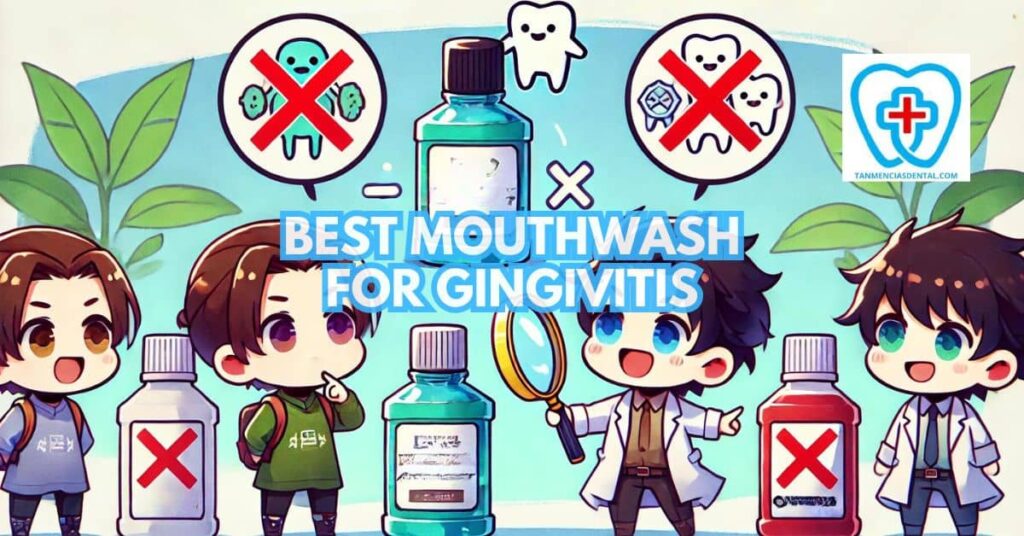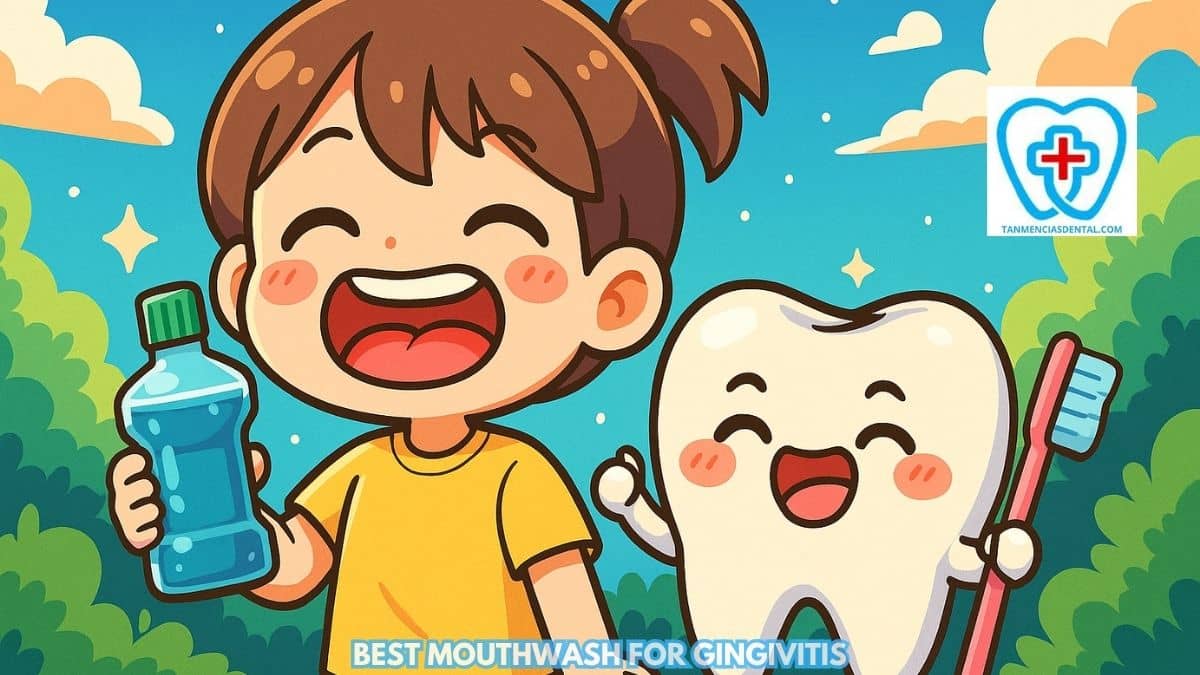Gingivitis is a common gum problem that causes redness, swelling, and bleeding of the gums.
It often develops when plaque, a sticky film of bacteria, builds up on the teeth and irritates the gum tissue.
Using the best mouthwash for gingivitis can help reduce bacteria, control plaque, and support overall gum health.
However, not every mouthwash is made to treat gingivitis effectively, and some ingredients can make gum irritation worse.
We’ll explain what to look for and what to avoid when choosing the right mouthwash to keep your gums healthy and strong.
1. Understanding Gingivitis: Causes, Symptoms, and Why Mouthwash Matters
Gingivitis begins when dental plaque, a sticky layer of bacteria, collects on the surface of the teeth and along the gumline.
Poor brushing or flossing allows this buildup to stay in place and irritate the gums.
The irritation causes inflammation, which leads to red, swollen, and tender gums that may bleed when you brush or floss.
Over time, untreated gingivitis can advance to periodontal disease, a more serious infection that damages the tissue and bone supporting the teeth.
This stage can cause receding gums and tooth loss if it is not treated by a dentist.
Using mouthwash helps reduce bacteria and loosen dental plaque, lowering the risk of gum irritation.
With regular cleaning and the right mouthwash, gingivitis can often be reversed before it turns into periodontal disease.
🦷 How Long Is A Dentist Appointment?
2. The Power of Mouthwash: Fighting Gingivitis
Mouthwash can be a strong helper in fighting gingivitis because it reaches parts of the mouth that brushing and flossing may not clean well.
An antiseptic mouthwash works by killing bacteria that cause gum inflammation and dental plaque buildup.
Brands like Listerine contain proven antibacterial ingredients that help control these harmful bacteria and freshen the mouth.
Regular rinsing with mouthwash can also help reduce bad breath, which often results from bacteria collecting around the gums and tongue.
Using it daily can ease symptoms such as gum bleeding and swelling while improving overall gum health.
The best mouthwash for gingivitis gives lasting protection and supports a cleaner, fresher mouth.
When used after brushing and flossing, mouthwash adds an extra layer of defense against gum problems.
Making antiseptic mouthwash a part of your daily oral care routine can help prevent gingivitis from turning into more serious gum disease.
🦷 Is It Bad To Brush Your Teeth With Baking Soda?
3. Antibacterial Allies: Ingredients to Fight Gingivitis
When choosing a mouthwash for gingivitis, it helps to know which ingredients fight bacteria most effectively.
Look for antibacterial agents such as chlorhexidine and cetylpyridinium chloride, which target the germs that cause gum inflammation and dental plaque.
Another helpful ingredient is hydrogen peroxide, which releases oxygen to clean the mouth and reduce the buildup of harmful bacteria.
It can also help whiten teeth slightly and support the healing of irritated gums when used correctly.
Chlorhexidine remains one of the most trusted treatments for reducing plaque, but it is often used for short periods under a dentist’s supervision.
Cetylpyridinium chloride is common in many over-the-counter mouthwashes and helps keep the mouth clean and fresh.
Choosing a mouthwash with these proven antibacterial ingredients helps control plaque, reduce swelling, and protect your gums from gingivitis.
🦷 Why Routine Dental Treatments Are Key to Avoiding Dental Emergencies
4. Soothing Relief: Anti-Inflammatory Ingredients for Gums
Mouthwashes containing anti-inflammatory ingredients can provide relief for irritated gums.
Aloe vera and chamomile are natural ingredients known for their soothing properties.
They help reduce swelling and promote healing of the gums, making them ideal for those with gingivitis.
In addition to soothing irritation, these ingredients can enhance overall gum health by reducing redness and discomfort.
Choosing a mouthwash with anti-inflammatory properties can help manage gingivitis symptoms and improve oral comfort.
🦷 Child Hates Brushing Teeth: Creating Positive Dental Habits

5. Fluoride: Your Friend for Strong Teeth and a Healthy Smile
Fluoride is a mineral that helps strengthen tooth enamel and prevent decay, which is vital for maintaining a healthy smile.
It protects teeth from cavities by making them more resistant to acid attacks from bacteria in the mouth.
A fluoride-containing mouthwash can support gum health by preventing tooth decay, which can exacerbate gingivitis.
Using fluoride mouthwash as part of your oral care routine can help ensure strong, healthy teeth and gums.
Consistent use of fluoride mouthwash can also contribute to long-term oral health.
🦷 Are Electric Toothbrushes Sustainable? Worth the Hype for the Environment?
6. Alcohol-Free for Sensitive Gums: Why It Matters
Alcohol-based mouthwashes can sometimes cause irritation and dryness in the mouth, especially for people with sensitive gums.
This dryness can lead to discomfort and may worsen problems like bad breath or a condition known as dry mouth.
Choosing an alcohol-free mouthwash helps prevent these issues by providing a gentler way to clean without stripping away moisture.
These formulas keep the mouth hydrated and protect the natural balance of saliva, which is important for washing away bacteria.
Regular use of alcohol-free mouthwash can make rinsing more comfortable and support better gum health.
For people who often experience dry mouth or irritation, switching to an alcohol-free option can make a noticeable difference in comfort and oral cleanliness.
🦷 Discover the Benefits of Using an Electric Toothbrush: Worth the Switch?
7. Skip the Harsh Detergents: Choosing Gentle Mouthwash
Some mouthwashes contain harsh detergents like sodium lauryl sulfate, which can irritate gums and oral tissues.
Choosing a gentle mouthwash without these harsh ingredients is important for those with sensitive gums or gingivitis.
Gentle mouthwashes effectively cleanse the mouth without causing irritation or discomfort.
They provide the necessary antibacterial action while being kind to delicate oral tissues.
Opting for a mouthwash with mild ingredients can help ensure comfort and effectiveness in managing gingivitis.
🦷 Integrating Regular Dental Checkups into Your Wellness Routine
8. Talk to Your Dentist: Finding the Perfect Mouthwash
Consulting your dentist is one of the best ways to find the right mouthwash for your specific gum needs.
Dentists can assess how severe your gingivitis is and determine if there are early signs of periodontitis, which is a more advanced form of gum disease.
They may recommend a mouthwash with ingredients that help control bacteria and reduce inflammation based on your oral condition.
Your dentist can also explain how often to use mouthwash and whether a prescription-strength formula would be more effective.
Regular visits allow your dentist to check if the mouthwash is improving your gum health or if your routine needs to change.
Early detection of periodontitis during these visits helps prevent further damage to the gums and supporting bone.
Working closely with your dentist ensures your mouthwash and daily care habits protect your gums and keep your smile healthy.
🦷 How to Eat After Brushing Teeth: Tooth-Friendly Eating
9. Using Mouthwash the Right Way for Better Gum Health
To achieve the best results with mouthwash, measure the recommended amount as stated on the label before rinsing.
Swish the liquid around your mouth for about 30 to 60 seconds, allowing it to reach every area, including along the gumline.
Avoid eating or drinking for at least 30 minutes afterward to let the active ingredients keep working.
When using chlorhexidine mouthwash, wait about 30 minutes after brushing because toothpaste can weaken its effect.
Following these simple steps helps the mouthwash work properly and keeps your gums healthier.
🦷 How to Get Plaque Off Your Teeth With Braces
10. Consistency is Key: Using Mouthwash Effectively
For mouthwash to be effective in managing gingivitis, it must be used consistently as part of your daily oral care routine.
Follow the instructions on the bottle regarding the amount to use and the duration of rinsing.
Rinsing for the recommended time ensures that the mouthwash reaches all areas of the mouth and effectively reduces bacteria and plaque.
Consistency in using mouthwash helps maintain its benefits and contributes to overall gum health.
Incorporating mouthwash into your routine alongside brushing and flossing can provide optimal protection against gingivitis.
🦷 Endodontic And Periodontal Treatment in Marikina
11. Brushing, Flossing, and Checkups: A Complete Oral Care Routine
Mouthwash works best when it is part of a full cleaning routine that includes a toothbrush and dental floss.
A soft-bristled toothbrush helps remove food and plaque from the surfaces of your teeth and along the gumline.
Brushing at least twice a day keeps bacteria under control and reduces the risk of gingivitis.
Using dental floss once a day removes plaque and debris from between teeth where a toothbrush cannot reach.
This combination helps prevent the buildup of plaque that can lead to gum inflammation and bad breath.
Regular visits to the dentist are also important for professional cleaning and checking for early signs of gum problems.
Following this complete routine keeps your teeth and gums strong and helps prevent gingivitis from developing or returning.
🦷 Professional Dental Services at Tan-Mencias Clinic in Marikina
👨⚕️ Conclusion
Selecting the right mouthwash for gingivitis involves understanding key ingredients and personal preferences.
Look for mouthwashes with antibacterial, anti-inflammatory, and fluoride ingredients while avoiding harsh substances.
Consultation with a dentist can provide valuable guidance tailored to your needs.
Consistent use of the right mouthwash, combined with a comprehensive oral care routine, can effectively manage gingivitis and promote healthy gums.
By making informed choices, you can protect your oral health and maintain a confident smile.
😊 Self-Promotion
Visit Tan-Mencias Dental Clinic in Parang, Marikina City, for a warm and welcoming dental experience.
Our friendly team is dedicated to providing personalized care to help you achieve a healthy and beautiful smile.
Whether you need a routine checkup or more specialized dental treatment, we’re here to support your oral health journey.
For any questions or to schedule an appointment, feel free to contact us at 0917-145-1074, message us on Facebook, or reach out through our website’s contact form.
We look forward to seeing you and helping you maintain a bright and confident smile!
❔ FAQs
1. How often should I use mouthwash for gingivitis?
Most mouthwashes for gingivitis are used once or twice a day after brushing and flossing.
Always follow the instructions on the label or your dentist’s advice.
Using it too often can irritate your mouth or reduce its effectiveness.
Consistent daily use is more helpful than occasional rinsing.
2. Can mouthwash alone cure gingivitis?
No, mouthwash alone cannot cure gingivitis.
It helps reduce bacteria and plaque, but brushing, flossing, and professional dental care are also needed.
Mouthwash works best as part of a full oral hygiene routine.
If symptoms continue, see your dentist for further care.
3. What ingredients should I look for in the best mouthwash for gingivitis?
Look for antibacterial ingredients such as chlorhexidine or cetylpyridinium chloride.
Fluoride helps strengthen teeth, while aloe vera or chamomile can soothe irritated gums.
Choosing a mouthwash with these ingredients supports gum healing and reduces inflammation.
4. Is alcohol-free mouthwash better for sensitive gums?
Yes, alcohol-free mouthwash is gentler and less likely to cause burning or dryness.
It cleans effectively without irritating delicate gum tissue.
This makes it a better choice for people with sensitive gums or those prone to mouth dryness.
5. When should I see a dentist about gingivitis?
You should visit a dentist if your gums bleed often, stay swollen, or remain red even after good brushing and rinsing.
Persistent gingivitis can lead to more serious gum disease if not treated.
A dentist can find the cause and suggest the best treatment or mouthwash for your needs.

